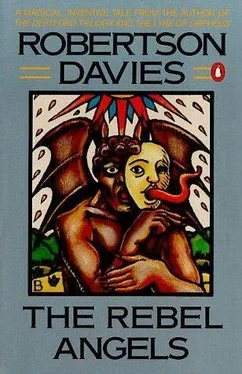Robertson Davies - The Rebel Angels
Здесь есть возможность читать онлайн «Robertson Davies - The Rebel Angels» весь текст электронной книги совершенно бесплатно (целиком полную версию без сокращений). В некоторых случаях можно слушать аудио, скачать через торрент в формате fb2 и присутствует краткое содержание. Жанр: Триллер, на английском языке. Описание произведения, (предисловие) а так же отзывы посетителей доступны на портале библиотеки ЛибКат.
- Название:The Rebel Angels
- Автор:
- Жанр:
- Год:неизвестен
- ISBN:нет данных
- Рейтинг книги:5 / 5. Голосов: 1
-
Избранное:Добавить в избранное
- Отзывы:
-
Ваша оценка:
- 100
- 1
- 2
- 3
- 4
- 5
The Rebel Angels: краткое содержание, описание и аннотация
Предлагаем к чтению аннотацию, описание, краткое содержание или предисловие (зависит от того, что написал сам автор книги «The Rebel Angels»). Если вы не нашли необходимую информацию о книге — напишите в комментариях, мы постараемся отыскать её.
The Rebel Angels — читать онлайн бесплатно полную книгу (весь текст) целиком
Ниже представлен текст книги, разбитый по страницам. Система сохранения места последней прочитанной страницы, позволяет с удобством читать онлайн бесплатно книгу «The Rebel Angels», без необходимости каждый раз заново искать на чём Вы остановились. Поставьте закладку, и сможете в любой момент перейти на страницу, на которой закончили чтение.
Интервал:
Закладка:
This at least had nothing to do with imagination. Urky was behaving in an intentionally irritating way, and betrayed that he knew what was in Hollier's mind. When they met, as they sometimes did at faculty meetings or more rarely on social occasions, he was likely to be affectionate, saying "How's the work going, Clem? Well, I hope? Run across anything in your special line lately? I suppose it's impossible to put your hand on anything really new?"
It was the sort of talk which, when it was said with one of Urky's teasing smiles, was enough to make Hollier uncivil, and afterwards, when he was talking to me, furious and abusive.
He was angry because Darcourt would not accuse Urky to his face, and threaten to put the police on him, which I could see plainly was not something Darcourt could do on wobbly evidence. All Darcourt knew was that Urky seemed to have borrowed a manuscript from Cornish, which could not now be traced, and it takes more than that to spur one academic to set the cops on another. Hollier, by the time he demanded that I take him to Mamusia, had grown thinner and more saturnine; feeding on his obsession. Chawing his own maw, like that Dragon in the Faerie Queene.
When Hollier told Mamusia he did not recognize the Knave of Coins, the unjust servant, I could not believe my ears. Parlabane was worse than ever, and his demands for money, which had been occasional before Christmas, were now weekly and sometimes more than weekly. He said he needed money to pay for the typing of his novel, but I couldn't believe it, for he would take anything from two dollars to fifty, and when he had sponged from Hollier he would come to me and demand further tribute.
When I say "demand" I mean it, because he was not an ordinary borrower; his words were civil enough but behind them I felt a threat, though what the threat might be I never found out – took care not to find out. He begged me with intensity, a suggestion that to refuse him would provoke more than just abuse; he seemed not far from violence. Would he have struck me? Yes, I know he would, and it would have been a terrible blow, for he was a very strong little man, and very angry, and I feared the anger even more than the pain.
So I kept up a modern woman's pretence that I was acting from my own choice, however unwillingly; but not far below that I was simply a woman frightened by masculine strength and ferocity. He bullied money out of me, and I never reached the point of anger where I would rather run the risk of a blow than submit to further bullying.
He didn't bully Hollier. Nobody could have done that. Instead he worked on the loyalty men feel for old friends who are down on their luck, which I suppose has at least one of its roots in guilt. There but for the Grace of God… ; that nonsense. He could whine ten dollars out of Hollier and within thirty seconds be in the outer room twisting another ten out of me. It was an astonishing performance.
His novel was to him what the Gryphius MSS were to Hollier. He lugged masses of typescript around in one of those strong plastic bags you get at supermarkets. There must have been at least a thousand pages of that typescript, for the bag was full even when Parlabane at last handed Hollier a wad which was, he said, almost a complete and perfect copy of the book. He hinted, but did not actually say, that a typist somewhere had the final version, and was making copies for publishers, and that what he still had in the bag was a collection of notes, drafts, and unsatisfactory passages.
Parlabane made rather a ceremony of handing over his typescript, but after he had gone, Hollier glanced at it, retreated in dismay, and asked me to read it for him and make a report, and perhaps to offer some criticism that he could pass on as his own. Whether Parlabane ever suspected this deceit I do not know, but I took care that he never found me grappling with his rat's-nest of fiction.
Some typescripts are as hard to read as bad handwriting, and Parlabane's was one of these. It was on that cheap yellow paper that does not stand up to correction in ink and pencil, to frequent crossings-out, and especially to that pawing a book undergoes when it is in the writing process. Parlabane's novel, Be Not Another, was a limp, dog-eared mess, unpleasing to the touch, ringed by glasses and cups, and smelly from too much handling by a man whose whole way of life was smelly.
I read it, though I had to flog myself to the work. It was about a young man who was studying philosophy at a university that was obviously ours, in a college that was obviously Spook. His parents were duds, unfit to have such a son. He had long philosophical pow-wows with his professors and friends, and these gurgled with such words as "teleological" and "epistemological", and there was much extremely fine-honed stuff about scepticism and the whole of life being a can of worms. There was a best friend called Featherstone, who seemed to be Hollier; he was just bright enough to play straight man to the Hero, who of course was Parlabane himself. (He had no name and was referred to throughout as He and Him in italics.) There was a clown friend called Billy Duff, or Plum Duff, who never got any good lines; this was undoubtedly Darcourt. There were sexual scenes with girls who were too stupid to recognize what an intellectual bonanza He was, and they either refused to go to bed with Him, or did and failed to come up to expectation. Light dawned when He went to another university for advanced study and met young man who was like a Greek God – no, he did not deny himself that cliche – and with the G.G. He was fulfilled spiritually and physically.
He denied himself nothing. Everybody wrangled far too much and didn't do nearly enough – even in the sexy parts. They weren't much fun except with the G.G. and those encounters were described so rhapsodically that it was hard to figure out what was happening except in a general way, because they talked so learnedly about it.
I cannot pretend to be a critic of modern fiction; for the moment, Rabelais was in the front of my mind; but anyhow I question whether this thing of Parlabane's was really a modern novel or perhaps a novel at all. It just seemed to be a discouragingly dull muddle, and so I told Hollier.
"It's his life, though not nearly so interesting as what he told me in The Rude Plenty; everything is seen from the inside, so microscopically that there's no sense of narrative; it just belly-flops along, like a beached whale."
"Doesn't it come to anything at all?"
"Oh yes; after much struggle He finds God, who is the sole reality, and instead of scorning the world He learns to pity it."
"Very decent of him. Plenty of caricatures of his contemporaries, I suppose?"
"I wouldn't recognize them."
"Of course; before your time. But I dare say there are some recognizable people who wouldn't be too happy to have their youthful exploits recalled."
"There's scandalous stuff, but it isn't described with much selection or point."
"I thought we would all be in it; he made enemies easily."
"You don't come off too badly, but he's rather hard on Professor Darcourt; he's the butt, who thinks he has found God, but of course it isn't the real eighteen-karat philosopher's God that He finds after his spiritual pilgrimage. Just a peanut God for tiny minds. But the queerest thing is that he hasn't a scrap of humour in it. Parlabane's a lively talker, but he seems to have no comic perception of himself."
"Would you expect it? You, a scholar of Rabelais? What he has is wit, not humour, and wit alone never turns inwards. Wit is something you possess, but humour is something that possesses you. I'm not surprised that Darcourt and I appear in a poorish light. No such bitter judge of old friends as a brilliant failure."
Читать дальшеИнтервал:
Закладка:
Похожие книги на «The Rebel Angels»
Представляем Вашему вниманию похожие книги на «The Rebel Angels» списком для выбора. Мы отобрали схожую по названию и смыслу литературу в надежде предоставить читателям больше вариантов отыскать новые, интересные, ещё непрочитанные произведения.
Обсуждение, отзывы о книге «The Rebel Angels» и просто собственные мнения читателей. Оставьте ваши комментарии, напишите, что Вы думаете о произведении, его смысле или главных героях. Укажите что конкретно понравилось, а что нет, и почему Вы так считаете.












